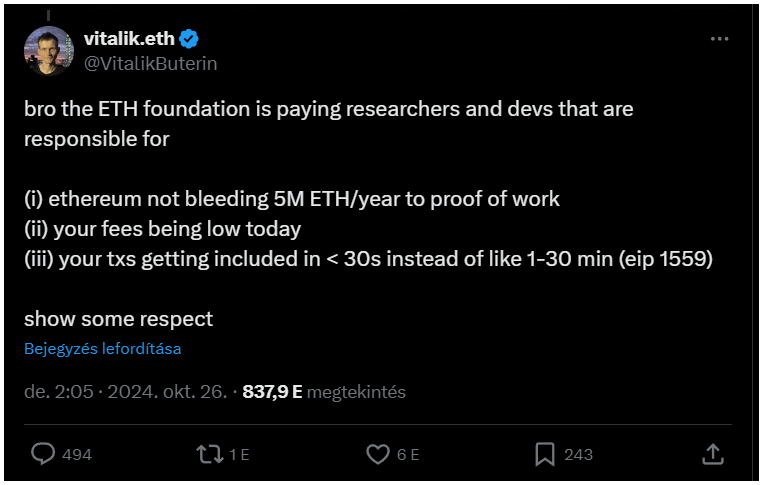The Ethereum Foundation, which supports the second-largest blockchain, has faced some scrutiny over its decision to sell rather than stake its ether holdings.
So, what’s the deal? Co-founder Vitalik Buterin has stepped in to clarify things.
Supporting Ethereum’s growth
It all kicked off with a social media post from Buterin on October 25, where he shared a roadmap for universal light client verification on Ethereum.

A user chimed in, asking him to stop dumping his ETH, referring to recent reports of him selling small amounts of his holdings. Buterin quickly responded, stating he hadn’t sold any ETH in the last month and that his holdings had actually increased.
This led to another community member asking about the Ethereum Foundation’s stance on selling versus staking.
Buterin explained that there are several reasons why the foundation regularly sells its ETH stash.
For one, the funds help pay researchers and developers who contribute to important advancements like EIP-1559, which has made transaction times faster and reduced network costs.
He also mentioned that the proceeds from these sales support various initiatives, including zero-knowledge technology for privacy, account abstraction for user security, and events aimed at promoting Ethereum around the world.
Thanks to these efforts, Ethereum has maintained its security and stability without any downtime since 2016.
Keeping it neutral
Now, let’s talk numbers. The foundation has sold 4,066 ETH, which is worth just over $11 million.
If they had staked their reported 271,000 ETH instead, they could have earned around $20 million a year at the current 3.1% staking return rate.
But here’s where it gets interesting, Buterin explained that one major reason for not staking ETH is to avoid being forced into making an official choice during a contentious hard fork.
He wants to keep Ethereum’s decentralized spirit alive by allowing other entities to stake on behalf of the network.
This way, no single organization can wield too much influence over the blockchain. Says the guy who rolled back the whole network, and created the Ethereum Classic, btw.
Money
In short, the foundation prefers to directly fund development and operations instead of staking. Buterin believes this approach aligns better with Ethereum’s long-term vision.
Buterin is keeping things transparent about why the Ethereum Foundation sells its ETH holdings.
It’s all about supporting development while maintaining the decentralized ethos that makes Ethereum an usable system.


